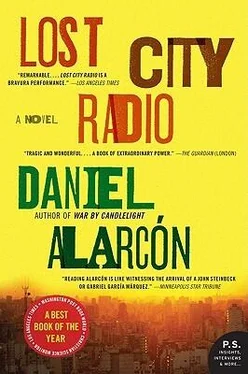Norma kept quiet but found herself cultivating a fondness for Rey in his absence, even though she had only known him that one evening. Or perhaps that was why: it was as if she had seen him die — and what could be more intimate than that? What if hers was the last friendly face he saw? The last friendly touch? She thought of him at night, wondered when he might appear. She dreamed of marrying him, because it seemed the most romantic act possible. She thought of ways to inquire about him without raising attention: a note? A phone call? Every day the tension rose, and every day, at the university, she expected to find him there among the milling crowds, at the center of some circle of students, cigarette in hand, blithely holding forth about his brief imprisonment. What if she saw him? What if he asked for his ID? She daydreamed about this: I’ve been carrying it, she’d say. She would make sure to smile the way her mother had taught her, that way that her mother had sworn beguiles men without giving away too much. Her mother, the expert on men. Norma often came home from the university to find her alone, glassy-eyed, the radio serenading the empty house. “Your father is off carousing,” she would slur. “He’s abandoned me.”
Norma would help her to the bedroom at the end of the hallway, undress her, and put her to bed, all the while repeating stories neither of them believed: “He’s working late, mother. Don’t be so suspicious, it’ll make you old.”
Other times, at the dinner table, Norma’s father and mother spoke in curt monosyllables, and Norma played along. She did her best pantomime of pleasant family life until her eyes crossed and her thoughts slipped away from her, and there he was, Rey blowing smoke through the open window of the bus, smiling stupidly, unaware he was about to vanish. Pass the rice, her father would say, and it would take Norma a moment to place herself again. What’s the matter with you? Nothing, Father. She would pass the plate with wobbly hands, her old man frowning and turning to her mother: You’ve spoiled this girl too much. And her mother would nod, meek in his presence, accepting blame for any and all errors, for the disappointing comportment of the girl on whose education they were wasting all that money. None of this had to be said; Norma knew it by heart, her father’s cold logic, but preferred not to think of it, preferred to think of Rey, mysterious and brave, and not her home with its stillness and its tension and its secrets.
Later, when she and Rey were a couple, she told him that she’d thought of him while he was gone, before she even knew him, and wondered aloud why her mind had wandered in his direction. He grinned. “I’m irresistible,” he said, as if stating a fact.
It was vanity, but she had to know: “Did you think of me?”
“Sure.”
“Really?”
“It’s an old story,” he said.
They were near downtown, in a district called Idorú, outside a movie theater that only played Bollywood films, English-Bengali-Hindu monstrosities. It had been two years since the night they met, a year since Rey had reappeared. He was buying tickets, and now he led her inside. She reached for his hand. The theater played the same movie for two months or more, colorful epics that drew hordes of young girls for the choreographed dance routines, and swarms of teenage boys for the battles with ornate swords and sabers. “I can’t understand Hindi,” Norma whispered, but Rey explained there was no need for translation, that the stories were simple. And it was true: the villains were so recognizable they were met with whistles and boos every time they appeared on screen. The heroes were applauded boisterously, of course, and Rey joined in. He took her hands and clapped them together, and in the low darkness, she could see his smile. Norma was uncomfortable and hot, the theater was loud and smelled of sweat and liquor. On screen, the actors chattered incomprehensibly. “Why do you bring me to these places?” Norma whispered.
“Because they exist. Aren’t you curious?”
The movie played continuously and the lights never came on. “All kinds of things happen here,” Rey said, “and all kinds of people come.” He was in the midst of educating Norma about her city. “You live too well,” he’d told her importantly one day. “You don’t know what this place is really like. I’ll show you.”
“That’s cute, country boy. I was born here.”
He’d insisted.
The theater, the dark guts of it, was something she’d never encountered. The people lit cigarettes and threw their butts at the screen, laughing, and the film was as impenetrable as the audiences’ reaction to it: men sang, and women danced, exchanging glances heavy with longing. The audience cheered approvingly when a mustachioed rogue kidnapped a woman, and clapped again when the same man was killed. There were jeers whenever a kiss failed to materialize, and hoots at the svelte, doe-eyed lead, whose silken black hair shone with an otherworldly gilt. Arguments dissolved into song, and the audience came and went from the theater as if it were a waiting room, as if the film were an excuse and completely beside the point. The doors creaked open, washing the screen in pallid yellow light, and she found it hard to concentrate on anything in particular. Language was the least of it: a drunk strummed an out-of-tune guitar in the corner of the theater; in the darkness, a multitude of voices promised to kill him with it.
After an hour, Norma asked to go.
But Rey wasn’t done. He walked her through the dense neighborhoods on the edges of downtown, past turn-of-the-century houses with peeling paint and glassless windows covered with thin, white sheets hooked on nails. Houses that looked like tombs, once-bright colors obscured by layers of soot — finally, heads poking out, always a woman with fierce eyes, craning to see what was happening, what the noise was, who was coming up the street, who was leaving and with whom. Ornamented ladies, grim-faced men, loud packs of boys who wore their sneakers without laces, the tongues flapping out in some strange salute. Neighborhoods like these are networks of impulses, Rey said, human, electrical, biological, like the forest: in the summer, inexplicable carnivals of flesh; in the winter, blankets in the windows and darkened homes. It was winter that day. “They use candles,” Rey said. “Like in the mountains.”
If Norma had known the future, she might have said, “Like we all will, when the war comes to the city,” but she couldn’t know, so she didn’t.
No one knew how bad it would get.
She clutched his hand and pressed close to him as they made their way down the crowded sidewalk. “What’s the forest like?” she asked.
He considered her question, which she had asked more than once simply because she loved to hear him speak of it. “It goes on forever. It’s endless invention, it’s gaudy, it’s gnarled trunks and rotting husks, sunlight peeking through the canopy, and bursts of rain hitting the roof of the forest like tapping on metal. And color, color, color.”
“You don’t sound like a scientist; you sound like a poet.”
Rey smiled. “Can I be both?”
“But you’d rather be a poet.”
“Who wouldn’t?” he said.
They walked on, and Norma only wanted to talk about love. The sidewalks were dirty, and the gutters and the streets, and she was imagining the jungle as he described it: its vastness, its astonishing impurities, its beautiful people and their customs. She didn’t want to see the city, not this part of it, not the ugly part. She was tired, and her feet ached, and on the other side of town, there were cafés and restaurants and parks where people wouldn’t rob you. “Were you always like this?” she asked. “Don’t you know how to treat a woman?”
Читать дальше












